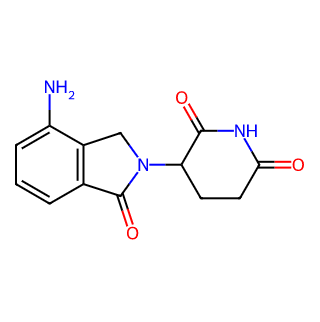- Synthetic anti-infective drugs
- Medications for the digestive system
- Antipyretic and analgesic drugs
- Medications for the blood system
- Medications for the respiratory system
- Anti-allergic drugs
- Medications for the urinary system
- Diagnostic medications
- Immunosuppressive and immunomodulatory drugs
- Vitamins and mineral supplements
- Antioxidants and medications for osteoporosis
- Antiparasitic drugs
- Ophthalmic medications
- Amino acids and their derivatives
- Dermatological medications
- Medications for the circulatory system
- Antitumor drugs
- Medications for the nervous system
- Hormonal and endocrine function-regulating drugs
- Antibiotics
- Others
CAS Number: 191732-72-6




Basic Information
Product Name: Lenalidomide
CAS Number: 191732-72-6
Molecular Formula: C13H13N3O3
Molecular Weight: 259.261 g/mol
Physical Properties
Appearance: Yellow solid
Density: Approximately 1.5 ± 0.1 g/cm³ (some sources may report slightly different values)
Melting Point: 269-271°C
Boiling Point: 614.0 ± 55.0°C at 760 mmHg
Flash Point: 325.1 ± 31.5°C
Refractive Index: 1.672
Steam Pressure: 0.0 ± 1.8 mmHg at 25°C
Solubility: Insoluble in water (0.3 g/l), sparingly soluble in methanol, tetrahydrofuran, toluene, and acetone, and insoluble in ethanol.
Chemical Properties
Mechanism of Action: Lenalidomide acts as a molecular glue that binds to cereblon (CRBN), a component of the Cullin ring E3 ubiquitin ligase complex. This interaction leads to the selective ubiquitination and degradation of certain lymphoid transcription factors, such as IKZF1 and IKZF3, by the CRBN-CRL4 ubiquitin ligase.
Immunomodulatory Activity: Lenalidomide is an orally active immunomodulator that stimulates T cell proliferation and the production of cytokines like interleukin-2 (IL-2) and interferon-gamma (IFN-γ). It also inhibits the production of pro-inflammatory cytokines such as TNF-α, IL-1, IL-6, and IL-12, while elevating the production of anti-inflammatory cytokine IL-10 from human PBMCs.
Antitumor Activity: Lenalidomide specifically inhibits the growth of mature B-cell lymphomas, including multiple myeloma, and induces apoptosis of these cells.
Pharmaceutical Applications
Indications: Lenalidomide is primarily used in the treatment of multiple myeloma, either as a monotherapy or in combination with other drugs such as dexamethasone.
Dosage and Administration: The recommended starting dosage is typically 25 mg, administered orally once daily on days 1 to 21 of a repeated 28-day cycle.

Tai Yau Street, San Po Kong, Kowloon, Hong Kong, China.



